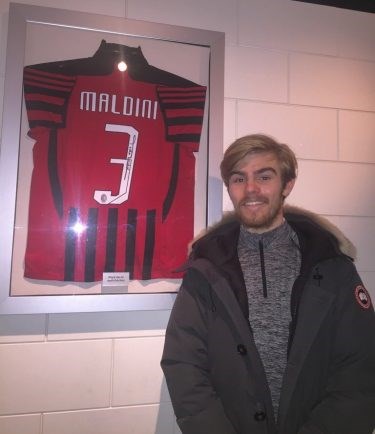A selection of leading sports journalists gathered in Manchester at the beginning of September for a week of debate at the annual Football Writing Festival. Max Carlyle, a BA (Hons) Football Business & Media student at UCFB Etihad Campus, attended the Festival and enjoyed a range of talks on the hottest topics – including the World Cup, the managerial merry-go-round and how to break into the industry – with some of the world’s most popular and respected football and sports journalists.
Max was ever present over the six days, and reported back on highlights for each session. Read on to find out more…
Follow Max on Twitter.

The Football Writing Festival concluded its fifth year on Thursday 6 September back at Hotel Football – the appropriate venue to draw the curtain on what has been another successful and fascinating series of events.
Fortunately, like last year, the Football Writing Festival’s European Union occupied the panel for the final show: Italian sports journalist and author of award-winning book The Italian Job Gabriele Marcotti, French sports writer, broadcaster, and author of the leading Thierry Henry biography Philippe Auclair, German sports journalist and author of 2015’s Das Reboot Raphael Honigstein, and writer for The Guardian and Spanish football virtuoso Sid Lowe.
Due to the international flair the panel boasted and the recent conclusion of the World Cup, conversation turned to the summer in Russia. Asking the questions, Marcotti felt it was only right to begin with Normandy-born Auclair, who’s France emerged as world champions. “We all believed France were never going to win the World Cup,” said Auclair. “We had excuses such as ‘they haven’t got the full-backs’, and Deschamps is largely perceived as ‘lukewarm’. The football France played under him wasn’t exactly riveting, and he was not rated as a footballer or a manager, but Deschamps can simply say ‘I did it again’.” Deschamps became only the second man to have won the World Cup as a captain (1998) and manager (2018), following in the footsteps of Germany legend Franz Beckenbauer, (1974 as player, 1990 as coach).
Focus was then diverted towards England’s fourth place finish under Gareth Southgate. Marcotti had his say on the losing semi-finalists, believing “England followed a conventional narrative and Southgate managed the insane expectations. The team behaved well and became likeable.” Honigstein lauded Southgate with his interesting perspective: “It was very smart on his behalf to manage the players from a media standpoint, getting them to tell their story not just from a football sense, but a personal sense.”
Englishman Lowe adopted a pragmatic approach to England’s World Cup showing: “Southgate managed expectations and the wider perception of the team. They still did what they always do with the exception of 2010. They got out of the group and progressed as far as they should have in terms of beating the teams below them in the rankings, and were beaten by those above.”
The debate then addressed socio-political issues surrounding England’s Raheem Sterling and Germany’s Mesut Ozil. The Arsenal playmaker recently announced his international retirement as a result of alleged racism and unjust scrutiny. Despite being just over the road from Old Trafford, nobody in the room raised their hand when asked if they had a genuine dislike for Manchester City’s Sterling, and Honigstein referred to Ozil as a “face of modern, cultural Germany”. The conclusion was that racist agendas simply had no place in society, especially not in the universal game of football.
Preselected questions from each panellist were then analysed in the truest sense and the audience was treated to some wonderful tactical deliberation. Starting with Lowe’s ‘athleticism versus technique’ conundrum, and using the summer move of Rodri to Atletico Madrid from Villarreal as an example, Lowe explained: “There is a shift away from the German/Spanish technique in place for physicality. Although Rodrigo hasn’t got off to a good start, he was said to have chosen Atletico to improve what he wasn’t good at.” This led to the panel differentiating between players who are physically slight and technically gifted. “Both Bernard and David Silva apply”, cited Marcotti. “There has been a paradigm shift in Guardiola proving you can be technical in England.” Auclair opted for Blaise Matuidi being a great example of the modern day athletic footballer, saying: “He is a ball of muscle, both small and dynamic.”
As part of a Question & Answer session with the audience, the panellists were quizzed on topics including Zinedine Zidane being part of the “Real Madrid ecosystem” for 17 years, the imbalance of resources between Europe’s average clubs and the elite, and whether Germany “need another reboot” following their World Cup humiliation.
All in all, the night was a suitable conclusion to what had been a special week. May next year’s Football Writing Festival prove to be as successful and inspiring.
















